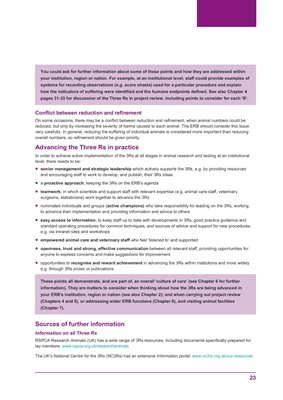
23
Conflict between reduction and refinement
On some occasions, there may be a conflict between reduction and refinement, when animal numbers could be
reduced, but only by increasing the severity of harms caused to each animal. The ERB should consider this issue
very carefully. In general, reducing the suffering of individual animals is considered more important than reducing
overall numbers, so refinement should be given priority.
Advancing the Three Rs in practice
In order to achieve active implementation of the 3Rs at all stages in animal research and testing at an institutional
level, there needs to be:
senior management and strategic leadership which actively supports the 3Rs, e.g. by providing resources
and encouraging staff to work to develop, and publish, their 3Rs ideas
a proactive approach, keeping the 3Rs on the ERB's agenda
teamwork, in which scientists and support staff with relevant expertise (e.g. animal care staff, veterinary
surgeons, statisticians) work together to advance the 3Rs
nominated individuals and groups (active champions) who take responsibility for leading on the 3Rs, working
to advance their implementation and providing information and advice to others
easy access to information, to keep staff up to date with developments in 3Rs, good practice guidance and
standard operating procedures for common techniques, and sources of advice and support for new procedures,
e.g. via intranet sites and workshops
empowered animal care and veterinary staff who feel 'listened to' and supported
openness, trust and strong, effective communication between all relevant staff, providing opportunities for
anyone to express concerns and make suggestions for improvement
opportunities to recognise and reward achievement in advancing the 3Rs within institutions and more widely
e.g. through 3Rs prizes or publications.
Sources of further information
Information on all Three Rs
RSPCA Research Animals (UK) has a wide range of 3Rs resources, including documents specifically prepared for
lay members: www.rspca.org.uk/researchanimals
The UK"s National Centre for the 3Rs (NC3Rs) has an extensive Information portal: www.nc3rs.org.uk/our-resources
You could ask for further information about some of these points and how they are addressed within
your institution, region or nation. For example, at an institutional level, staff could provide examples of
systems for recording observations (e.g. score sheets) used for a particular procedure and explain
how the indicators of suffering were identified and the humane endpoints defined. See also Chapter 4
pages 31-33 for discussion of the Three Rs in project review, including points to consider for each "R".
These points all demonstrate, and are part of, an overall "culture of care" (see Chapter 6 for further
information). They are matters to consider when thinking about how the 3Rs are being advanced in
your ERB's institution, region or nation (see also Chapter 2); and when carrying out project review
(Chapters 4 and 5), or addressing wider ERB functions (Chapter 6), and visiting animal facilities
(Chapter 7).